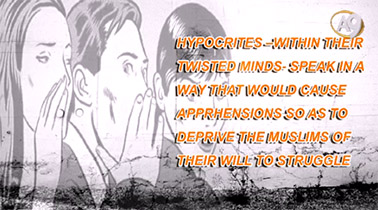The Hypocrites Are Wrapped Up in Their Previous Lives and Feel An Inferior Admiration for Unbelievers
Some of the most extensive information on the hypocrites in the Qur’an is provided in the story of the Prophet Moses (pbuh). When scrutinized well, one may see that the hypocrite of today shares many characteristics with the hypocrite who lived in the time of Moses.
The Children of Israel were living on the lands of Egypt under the rule of the Pharaoh. The Egyptians enslaved and restrained them by torture. Moses took the Children of Israel away from the lands of the Pharaoh to rescue them from the cruel practices, oppressions and tortures. The hypocrites who were among the Children of Israel were supposed to be grateful and pleased for this blessing of God, to be saved from the oppression, slavery and torture. But instead, assuming a nefarious morality, they told Moses: “We suffered harm before you came to us and after you came to us”:
They said: "We suffered harm before you came to us and after you came to us." [(Moses said:] “It may well be that your Lord is going to destroy your enemy and make you the successors in the land so that He can see how you behave.” (Surat al-A’raf, 129)
As clearly seen, hypocrites, in a defeatist manner, feel a deep longing for the life they left behind although they were then enslaved and humiliated.
Moses told his tribe: “You are severely oppressed here. Let me save you from the oppression and humiliation of the Pharaoh and take you to the lands God promised you where you can live freely.” Upon this, the Children of Israel set off along with him. However, after a while, the hypocrites assumed a different stance towards Moses and said: “We cannot find the Egyptian lifestyle, cuisine, and the culture in the desert. Even if we are enslaved and humiliated, we want to return to Egypt.”
Instead of rejoicing over the blessings God grants them, the hypocrite yearns for the kind of life the unbelievers experience. They want to possess the properties the unbelievers value, they want to be present at places where the unbelievers consider as important. They want to talk like unbelievers, eat and drink like them. They long for the selfish, loveless kind of life lacking quality. In the Qur'an, God informs us of this stance of the hypocrites:
And when Moses was looking for water for his people, We said, “Strike the rock with your staff.” Then twelve fountains gushed out from it and all the people knew their drinking place. “Eat and drink of God's provision and do not go about the earth corrupting it.”
And when you said, “Moses, we will not put up with just one kind of food so ask your Lord to supply to us some of what the earth produces – its beans, cucumbers, garlic, lentils and onions,” he said, “Do you want to replace what is better with what is inferior? Go back to Egypt, then you will have what you are asking for.” Abasement and destitution were stamped upon them. They brought down anger from God upon themselves. That was because they rejected God’s signs and killed the prophets without any right to do so. That was because they rebelled and went beyond the limits. (Surat al-Baqara, 60-61)
The hypocrites of the time, demanding “beans, cucumbers, garlic, lentils and onions", actually indicates their yearning for the culture of the irreligious system. In that era, the family of the Pharaoh employed a traditional way of cooking of these foods and had a distinct cuisine. The hypocrites essentially admired the fake pomposity of that culture. Along with its cuisine, the hypocrites also admired the derisive, arrogant and snobby system in Egypt, which involved many details such as the golden calf sculpture, which was essentially an element for flaunting.
In a similar way, the hypocrites felt a deep admiration for their language as well. Although the language of the hypocrites was Hebrew, they considered the language of the Pharaoh more flamboyant and supposed that they would make a name for themselves by speaking that language.
For that reason, at the expense of living under oppression, the hypocrites somehow wished to benefit from the showy and radiant milieu of the system of the Pharaoh. The admiration they felt for this system was imbedded in their subconscious. No matter how many times Moses explained the truth, they were in no way convinced because they were wrapped up in this system. Explicitly or implicitly they expressed their yearning for their previous life.
Today we also come across with such people who long for the lives they had before they had faith although they live together with Muslims. Indeed, after joining Muslims,
these people start to have a beautiful life incomparable to that of unbelievers. In their previous lives, they were subjected to all kinds of wicked treatment; they witnessed relationships based on self-interest, insincerity, lies, hypocrisy, ruthlessness, lack of respect and love.
They could clearly see the severe contrast between these two ways of living. Despite this obvious fact, these people still yearn for and feel admiration for the life they left behind. In fact, this is an indication of their tendency to faithlessness in their hearts.
They always dream how their lives would be if they were to live with unbelievers, although they know that they would be again unhappy, humiliated, unappreciated, and abused for interests of other people. Even under those conditions, they would still consider it to be good to turn back to that humiliation.
They always dream about being with those people in those environments and fantasize about how their lives would be. They deceive themselves thinking that the irreligious too would protect and have an affection for them.
These opinions that they have are actually a great fallacy, and they are well-aware of that painful truth too because the entirety of life and all of the relationships of unbelievers are based on self-interest. For that reason, in an environment where faith does not exist, no one would do anything good to another person unless he is offered some serious interests. If a person with no fear of God or faith for Him approaches one, he definitely has a delicate plan for deriving some interests in his mind. He either hopes to benefit from that person in the financial sense or use him in the physical sense. Alternatively, he wants to reach someone around that person or he wishes to take advantage from that person or one of his family members.
When one tells about this fact to these people who are inclined to irreligion, and asked, “These people do not have an affection for you like believers who love you for God. What will they see in you to have an affection for? Why do you long for their false affection?”, they continue to deceive themselves with various excuses and pretexts.
While Muslims find true happiness, joy, quality, beauty and affection in Muslims, the hypocrite fancies the life of the irreligious, which is no better than an envious, cynical, filthy life. The hypocrites fail to grasp that everything that they consider as elaborate in the life of the irreligious are unattractive and worthless both in the material and moral sense. Their poor comprehension and intelligence are one of the greatest scourges granted by God upon the hypocrites.






















